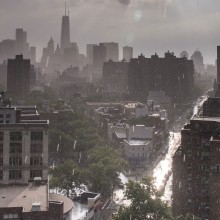
“And I, you, and he; and we, ye, and they, are all bats; and I’m a crow, especially when I stand a’top of this pine tree here. Caw! caw! caw! caw! caw! caw! Ain’t I a crow? And where’s the scare-crow? There he stands; two bones stuck into a pair of old trowsers, and two more poked into the sleeves of an old jacket.”
“Wonder if he means me?—complimentary!—poor lad!—I could go hang myself. Any way, for the present, I’ll quit Pip’s vicinity. I can stand the rest, for they have plain wits; but he’s too crazy-witty for my sanity. So, so, I leave him muttering.”
“Here’s the ship’s navel, this doubloon here, and they are all on fire to unscrew it. But, unscrew your navel, and what’s the consequence? Then again, if it stays here, that is ugly, too, for when aught’s nailed to the mast it’s a sign that things grow desperate. Ha, ha! old Ahab! the White Whale; he’ll nail ye! This is a pine tree. My father, in old Tolland county, cut down a pine tree once, and found a silver ring grown over in it; some old darkey’s wedding ring. How did it get there? And so they’ll say in the resurrection, when they come to fish up this old mast, and find a doubloon lodged in it, with bedded oysters for the shaggy bark. Oh, the gold! the precious, precious, gold! the green miser’ll hoard ye soon! Hish! hish! God goes ‘mong the worlds blackberrying. Cook! ho, cook! and cook us! Jenny! hey, hey, hey, hey, hey, Jenny, Jenny! and get your hoe-cake done!”
“Ship, ahoy! Hast seen the White Whale?”
So cried Ahab, once more hailing a ship showing English colours, bearing down under the stern. Trumpet to mouth, the old man was standing in his hoisted quarter-boat, his ivory leg plainly revealed to the stranger captain, who was carelessly reclining in his own boat’s bow. He was a darkly-tanned, burly, good-natured, fine-looking man, of sixty or thereabouts, dressed in a spacious roundabout, that hung round him in festoons of blue pilot-cloth; and one empty arm of this jacket streamed behind him like the broidered arm of a hussar’s surcoat.


